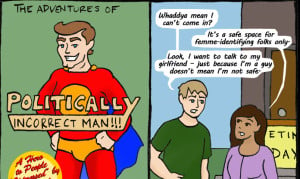To paraphrase a message I received, “I have shoulder and back injuries, so I’ve been seeing a massage therapist for a year to help me with them. This last time I went, he massaged my shoulders and back like usual then started rubbing my clit. I told him that made me uncomfortable and he stopped, but now I don’t know what to do.”
Other versions of this same sentiment are “I told him I wasn’t going to have sex with him, but he could spend the night. I woke up with him on top of me. Was I raped?” or “I was walking and someone grabbed my crotch. Does it matter?”
For anyone who has these experiences, this is my response to the author of the first question, which I hope brings relief to the rest of you.
Based on what you described, you were, without question, sexually assaulted. As a victim, this might throw you into shock. Take a nap and then come back here so we can talk. Being violated in any way can cause a person to feel really unsafe, in addition to any number of these things.
How overwhelming! First, know there’s a helpline to access 24 hours a day. Here’s a number for them: 800-656-4673. Here’s the website: rainn.org. If you’re outside of the US, hotpeachpages.net will help identify the resources in your area.
When I was abused, I called a helpline. The person who answered checked to see that I wasn’t in immediate danger and then told me she was going to watch the clock for one minute, during which I could cry.
I started off thinking how rude that my breakdown was being timed, and then I realized how desperately I needed that cry to happen, but also to end. I blasted out my tears without feeling like I couldn’t stop because someone was there to stop me. I don’t know that this will be your experience, but I do hope whoever it is will be a great sounding board for your concerns and confusion. They’ll help you sort out the next steps too.
Let’s acknowledge that this situation is really annoying. You didn’t do anything wrong. It’s not your fault. Yet you’re responsible for all this extra self-care, like watching this video and asking for help.
An ally is someone who is with you to deal with these annoyances – someone who can help you with other resources, step in when you need a moment, and make sure you’re being heard. This could be an acquaintance, best friend, coworker, neighbor. For me, it was a roommate.
There are actually people trained to give this kind of support to victims of sexual violence. They’re called advocates. The hotline I recommended can help you connect to a local office for crime and sexual assault victim advocates who will meet you and guide you through the whole process. They’ll totally respect how you want to proceed. They’ll explain the systems available. They’re completely listen to what you’re afraid of and what you need.
If you decide to report what happened to the massage licensing board, the police, or if this were at a school or workplace it might be the dean of students or human resources – an advocate can make doing so significantly less difficult. I’ve sought out advocates for ideas. They helped me sort out whether or not to get a restraining order and how to do it.
Ultimately, official records of what happened are organized by the authorities. What you share is kept on file so if you, or anyone else harmed by this person, want to press charges, the data is there. Some victims find reporting is super challenging because they’re having to recount the trauma. It can also be really messy because essentially you’re undergoing a legal procedure.
Note 1: If you think reporting makes a big mess, that’s society getting up in your brain and fooling you. Reporting doesn’t make the mess, assaulting you made the mess.
Note 2: Bring along an ally or an advocate for this very reason. They can help you ask questions, get you some water, and help you sort through your options.
I found it helpful to check in at the police station and show them the teeth marks on my nose. Tell them the story in a quiet, safe place. They didn’t look at the bites and go arrest someone. They took photos and asked me what I wanted to do, how I wanted to proceed. I realize it’s not like this for everyone, so you make the calls. Just don’t forget your people.
Once the adrenaline of doing new, scary things like crying to a hotline operator and meeting with detectives wears off, you’ll need to be wrapped up by your people. If you’re introverted, maybe that’s a super shy friend, or relative, who you know won’t take a lot of energy but will trust you and be there. If you’re an extrovert, maybe it’s a room full of friends who come over for nachos and video games. All this mostly so you can participate in being you and not being your assault.
These are suggestions, not rules. Every situation is unique and your comfort with resources is undoubtedly going to vary.
For those of us who get to help you, we get to. Your people, the police, advocates, and allies can be a big old system that will tell you, “You were assaulted. What happened to you is not okay. You’re going to be okay.”
There’s a channel which delves into this topic more completely called Engage by Uplift. Please subscribe to them, to us, stay engaged, and stay curious.




















